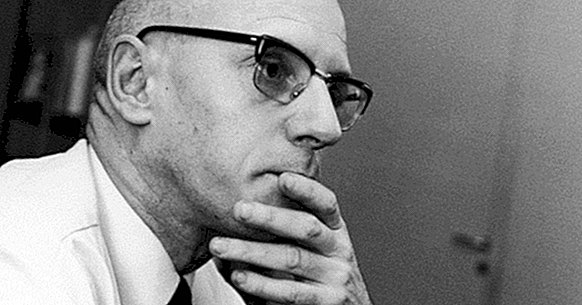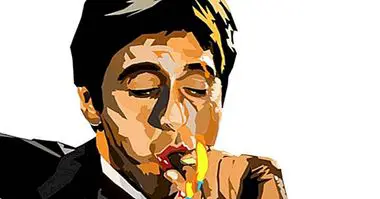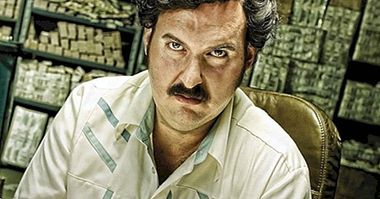75 phrases and reflections by Michel Foucault
Paul-Michel Foucault, better known as Michel Foucault , was born in Poitiers (France) in 1926.
He was a historian, psychologist, social theorist and French philosopher who, throughout his life, served as a professor at several French and American universities and was a professor of History of thought systems at the Collège de France. His thinking is influenced by great philosophers such as Karl Marx or Friedrich Nietzsche.
Phrases of Michel Foucault to understand his thought

Foucault died on June 25, 1984, but left many appointments for memory. Then we present a list with the best quotes, reflections and quotes of this famous character .
1. Knowledge is the only space of freedom of being.
Foucault expresses with this thought that knowledge is the way to get freedom .
2. Do not ask me who I am, or ask me to remain the same.
People evolved over the years, we are not static beings . We adapt and change as our life progresses.
3. Man and vanity move the world.
Man moves the world, just like vanity. Now, arrogance and arrogance move the world through manipulation and self-profit.
4. The most unarmed tenderness, as well as the bloodiest of powers, need confession.
A phrase of Michel Foucault that compare tenderness with the bloodiest of powers .
5. Language is, as you know, the murmur of everything that is pronounced, and it is at the same time that transparent system that makes us, when we speak, understand us; in a few words, language is both the fact of the accumulated speech in the story and also the very system of the language.
The language we speak is the result of many years of human communication and it allows us to express our thoughts .
6. Madness can not be found in the wild. Madness does not exist except in a society, it does not exist outside of the forms of sensibility that isolate it and of the forms of repulsion that exclude it or capture it.
Madness does not make sense if there are no social values and norms that we must follow . Everything that is not considered normal in society is considered insanity.
7. For the State to function as it works, it is necessary that there be from man to woman or from adult to child specific relations of domination that have their own configuration and relative autonomy.
Another Foucault thought about power and submission . This character was always passionate about politics.
8. Discourse is not simply that which translates struggles or systems of domination, but that for which, and by means of which one struggles, that power of which one wants to take over.
Again, another phrase about power and dominance . But on this occasion, the author relates it to language and discourse.
9. What makes literature literature? What is it that makes the language that is written there about a book be literature? It is that kind of previous ritual that traces in the words its space of consecration. Therefore, since the blank page begins to fill in, since the words begin to be transcribed on this surface that is still untouched, that is when each word is in some way absolutely disappointing in relation to literature, because there is no word that belongs by essence, by right of nature to literature.
The language is a construction of the human being to be able to communicate . Foucault reflects on literature and written language.
10. Man is an invention whose recent date shows with all ease the archeology of our thought.
A phrase that speaks of modern man and our way of thinking.
11. Every education system is a political way of maintaining or modifying the adequacy of speeches, with the knowledge and powers that they imply.
Education is, after all, a form of socialization . Foucault also relates it to politics.
12. True reason is not free from all commitment to madness; on the contrary, it must follow the paths that it indicates.
Foucault reflecting on reason. He does not understand it without the concept of madness .
13. If the genealogy raises for its part the question of the soil that has seen us being born, of the language we speak or of the laws that govern us, it is to highlight the heterogeneous systems, which, under the mask of our self, prohibit us all identity.
Our thinking and our culture are a reflection of our ancestors and previous generations.
14Multiple power relations go through, characterize, constitute the social body; and these can not be dissociated, nor be established, nor function without a production, an accumulation, a circulation, a functioning of discourse
Foucault expresses his idea about power relations , and how these can not be understood separately.
15. It is ugly to be worthy of punishment, but not glorious to punish
Doing things wrong is not good, but neither is punishing, as Foucault explains.
16. What is proper to knowledge is neither to see nor to demonstrate, but to interpret
Another phrase of Michel Foucault on knowledge. For the author, this manifests itself in the interpretation.
17. Between each point of the social body, between a man and a woman, in a family, between a teacher and his student, between the one who knows and the one who does not know, pass power relations that are not the pure and simple projection of the great power of the sovereign over individuals; they are rather the loose and concrete floor on which that power is incardinated, the conditions of possibility of its functioning
A reflection that could well be expressed by any author of systemic psychology . Interpersonal relationships are dynamic and changing.
18. Each individual must lead his life in such a way that others can respect and admire it
The others will only admire and respect those people who really lead the life they want.
19. Prisons, hospitals and schools have similarities because they serve the primary purpose of civilization: coercion
A phrase that tells us about the coalition among human beings . That is to say. a pact or union between individuals or social groups.
20. When the confession is not spontaneous or imposed by some inner imperative, it is torn away; it is discovered in the soul or torn from the body
A refined reflection on sincerity.

21. I am happy with my life, but not so much with myself
Foucault confessing some of his deepest thoughts.
22. When a judgment can not be stated in terms of good and evil, it is expressed in terms of normal and abnormal. And when it comes to justifying this last distinction, considerations are made about what is good or harmful to the individual. They are expressions of a constitutive dualism of Western consciousness
A reflection on how we usually use dualism when judging other people or situations.
23. You have to be a hero to face the morality of the time
In this life you have to be brave and face situations that present themselves without fear. Although sometimes it is complicated.
24. For two decades I have been living in a passionate state with one person; it is something that is beyond love, of reason, of everything; I can only call it passion
Romantic love invades our lives and can bind us to another person because of the emotions it awakens in us.
25. Freedom is the ontological condition of ethics; but ethics is the reflective form that freedom takes
There is a relationship between ethics and freedom , as expressed by Michel Foucault.
26. As for the disciplinary power, it is exercised by making itself invisible; instead it imposes on those to whom it subjects a principle of obligatory visibility
Definitely, Michel Foucault was very interested in human relations and power relations. This is another reflection on political hegemonies and how they blur with cultural consensus.
27. In reality, there are two kinds of utopias: the socialist proletarian utopias that enjoy the property of never being realized, and the capitalist utopias that, unfortunately, tend to be realized very frequently.
Possibly this reflection has its influence on Marxist thought. Foucault always had a great sympathy for socialist ideology .
28. The history of struggles for power, and consequently the real conditions of its exercise and sustenance, remains almost totally hidden. Knowledge does not enter into it: that should not be known.
The power struggles are hidden for most of society, because there are interests to be so.
29. Social practices can lead to engender domains of knowledge that not only cause new objects, concepts and techniques to appear, but also make appear totally new forms of subjects and subjects of knowledge. The same subject of knowledge has a history.
Social practices have a great impact on our knowledge, thinking and our way of doing things.
30. All modern thought is permeated by the idea of thinking the impossible.
Irrational beliefs and, in many cases, the desire to achieve little possible things are normal in modern individuals.
31. Literature is not the general form of any work of language, nor is it the universal place where the work of language is situated. It is in some way a third term, the vertex of a triangle through which the relationship of language with the work and the work with language passes. I think that a relation of this kind is what is designated by the word literature.
Literature and language are intimately related . The word, literature and human thought go hand in hand, and this is what the French philosopher reflects in this abstruse quote.
32. For the State to function as it works, it is necessary that there be from man to woman or from adult to child specific relations of domination that have their own configuration and relative autonomy.
The state can not be understood without well-defined standards for the members of society.
33. The truth does not belong to the order of power and instead has an original kinship with freedom: many other traditional themes in philosophy, to which a political history of truth should turn showing that the truth is not free by nature , nor servant the error, but its production is entirely crossed by power relations. The confession is an example.
A curious reflection of the image that the author has about what freedom is and how power influences it. It again affects the idea of society as a set of protocols and laws established by the hegemonic power of the moment.
34. The old power of death, in which the sovereign power was symbolized, is now carefully covered by the administration of bodies and the calculating management of life.
A prayer, expressed by Michel Foucault, which speaks of death and sovereign power.
35. Prison is the only place where power can manifest itself nakedly, in its most excessive dimensions, and justify itself as a moral power.
The prison is a place where the freedom of the prisoners disappears . Here it is possible to exercise power and justify it as a moral power. An idea related to your panopticon.
36. The moment in which it is perceived that it was according to the economy of power, more effective and more profitable to watch than to punish. This moment corresponds to the formation, at once rapid and slow, of a new type of exercise of power in the eighteenth and early nineteenth centuries.
Another one of the thoughts on the power of Michel Foucault, that refers to the evolution of power in modern times .
37. Between marks and words there is no difference between observation and accepted authority, or verifiable and tradition. Everywhere there is the same game, that of the sign and the like, and therefore nature and the verb can be infinitely interwoven, forming, for those who can read, a great single text.
Foucault speaks, with this thought, of the interpretation of the texts.
38. Crime, with the hidden agents it procures, but also with the widespread raking that it authorizes, constitutes a means of perpetual surveillance of the population: an apparatus that allows the control of the entire social field through the criminals themselves.
In these words it is possible to read the message of this author, who explains how laws are made to control the population .
39. Language is, from one end to another, discourse, thanks to this singular power of a word that makes the system of signs pass to the being of what is meant.
Words become discourses thanks to the meaning we give them.
40. Structuralism is not a new method; it is the awake and restless consciousness of modern knowledge.
Michel Foucault giving his opinion on structuralism , a linguistic theory that considers language as a structure or a system of relationships.
41. Things and words are going to separate. The eye will be destined to see and only to see; the ear only to hear. Speech will of course have as its task to say what it is, but it will be no more than what it says.
A phrase by Michel Foucault on the word and the discourse that invites reflection.
42. The doctrine binds individuals to certain types of enunciation and consequently prohibits them from any other; but it is used, in reciprocity, of certain types of enunciation to link the individuals among them, and to differentiate them by themselves from the others.
Although the doctrine can be used to link people, it also refers to the limits to freedom of expression .
43. There is no power relationship without a correlative constitution of a field of knowledge, nor of knowing that it does not suppose and does not constitute power relations at the same time.
The relationship between knowledge and power is a reciprocal relationship, as expressed by Foucault in this sentence.
44. Can it be surprising that the prison resembles factories, schools, barracks, hospitals, all of which resemble prisons?
Foucault exposes a question that undoubtedly leads many people to reflect on prisons.
45. Strategic maps are needed, combat maps, because we are in permanent war, and peace is, in that sense, the worst of the battles, the most underhanded and the most petty.
One of the worst practices that can be carried out by the human being is war . We should devote all our efforts to live in peace and harmony.
46. All analytical knowledge is, therefore, invincibly linked to a practice, to this strangulation of the relationship between two individuals, in which one listens to the language of the other, thus releasing his desire for the object he has lost (making him understand that he has lost) and freeing him from the always repeated neighborhood of death (making him understand that one day he will die).
A thought of Michel Foucault on analytical knowledge and how it is linked to practice.
47. The commentary conjures the chance of the discourse when taking it into account: it allows saying something other than the text itself, but with the condition that it is that same text that is said, and in a certain way, the one that is made.
Comments can be another version of the text . The comment without the text does not make sense.
48. It is customary to believe that the prison was a kind of deposit of criminals, a deposit whose inconveniences would have manifested itself with the use of such form that it was said that it was necessary to reform the prisons, to make them an instrument of transformation of individuals .
Prisons should serve so that people can reform. Unfortunately, this is not always the case.
49. In all times, and probably in all cultures, body intimacy has been integrated into a system of coercion; but only in ours, and from a relatively recent date, it has been divided so rigorously between Reason and Unreason, and, very soon, by way of consequence and degradation, between health and illness, between normal and the abnormal.
Bodily intimacy has always awakened a great debate between reason and unreason.
50. The important thing is that bodily intimacy has not only been a matter of sensation and pleasure, of law or of interdiction, but also of truth and falsehood, that the truth of the union between bodies has become essential. , useful or dangerous, precious or fearsome; in sum, that the corporal intimacy has been constituted as a bet in the game of the truth.
Intimate relationships are a great source of sensations, where not only two bodies are stripped. Foucault, beyond his works of sociological and philosophical content, he also studied human sexuality in depth .
51. The body interrogated in the torture is at the same time the point of application of the punishment and the place of obtaining the truth. And in the same way that the presumption is jointly an element of investigation and a piece of guilt, on the other hand the regulated suffering of the torment is at the same time a measure to punish and an act of information.
Another reflection on the truth and its obtaining, and how the torment resulting from the lie is the worst punishment.
52. The signature system inverts the relationship of the visible with the invisible. Similarity was the invisible form of what, in the depths of the world, made things visible; However, in order for this form to come out in the light, a visible figure is needed to take it out of its profound invisibility.
A sentence that highlights the similarity and how it relates to invisibility.
53. Discipline is a principle of control of the production of discourse. She sets her limits for the game of an identity that takes the form of a permanent updating of the rules.
Discipline is a way of exercising control . Thus, it sets limits and rules and stifles the free will and creativity of human beings.
54. The author is the one who gives the unsettling language of fiction its units, its knots of coherence, its insertion in the real.
The author is responsible for the reader to feel the sensations and emotions in the works of fiction.
55. The example was sought not only by raising the awareness that the slightest infraction ran the risk of being punished, but provoking an effect of terror by the spectacle of power falling on the culprit.
In this extract, we talk about the rules violated are not only punished, but the idea of infringing them causes fear .
56. Where there is power, there is resistance
Foucault establishes a dialectic between opposing forces.
57. I'm not a prophet, my job is to build windows where once there was only a wall
There is no revealed truth, but indications that exist in the present
58. Perhaps today the goal is not to discover what we are, but to reject it
This philosopher talks about our conflicting relationship with our self-image.
59. The Enlightenment, which discovered liberties, also invented the discipline
New forms of liberation bring with them other control alternatives .
60. Do not ask me who I am and ask me to always stay the same
People are a constant flow of changes.
61. The individual is the product of power
The clashes of forces define where one entity begins and where another begins.
62. The language of psychiatry is a monologue of reason about madness
One of Foucault's phrases that criticize the use of rationality as circular explanation of reality .
63. Unlike the soul represented by Christian theology, the soul is not born of sin and is subject to punishment, but is born of punishment and monitoring mechanisms
Subjectivities appear with the awareness of danger.
64. I think there is no need to know exactly what I am
Foucault rejected essentialisms.
65. There is no glory in punishing
Punishment only fulfills an instrumental function.
66. What I want to communicate is not that everything is bad, but everything is dangerous
This philosopher strips of value judgments his descriptions of power dynamics.
67. Man is a recent invention, and his date of disappearance may be near
Knowing ourselves small in history is necessary to relativize our vision of reality.
68. We are entering the period of compulsory reification
The new ways of life lead us to treat everything as an object available in the market.
69The game will continue to be worthwhile as long as we do not know how it ends
Uncertainty adds meaning to projects.
70. Power and pleasure do not vanish; they are persecuted and reactivated
Both elements form a symbiosis.
71. Everything is dangerous, nothing is innocent
For Fuocault, reality is full of unpredictable edges.
72. Power, in short, is exercised more than is possessed
Power is not an object, but a relational dynamic.
73. It's fascinating how much people like to judge
Project fears and distrust it is a constant in life in society.
74. From the point of view of wealth, there is no distinction between necessity, comfort and pleasure
In good living conditions, well-being forms a unit with comfort.
75. Discourse is not life; your time is not yours
The explanations about what happens are part of a logic different from reality.



















